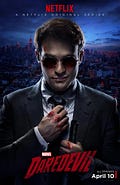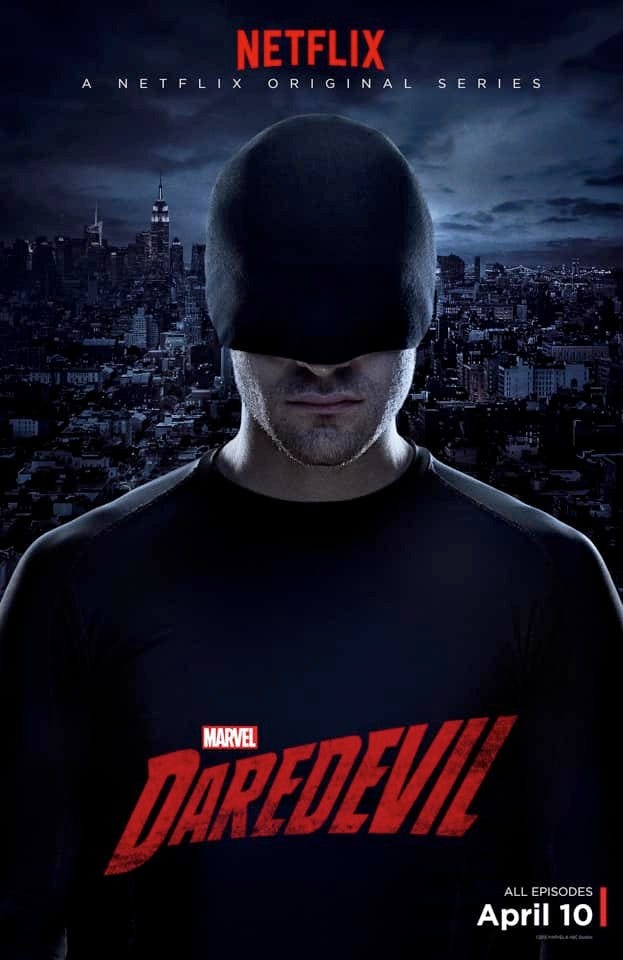Marvel Netflix Series: DAREDEVIL (Season 1)
The first in a series on the ex-Netflix Marvel shows. I couldn't see them before.
Season 1 of MARVEL’S DAREDEVIL is leagues above all non-Loki Disney+ MCU shows. I love that it’s a mix of crime noir, martial arts thriller, and legal drama. Solid pacing, really fluid fight scenes — and I love that it starts DD in media res and peppers in the origin along the way.
SPOILERS FOLLOW:
The cast is strong and extremely lovable. There are occasional deliveries that needed another take or two, but that’s forgivable when the bulk of the experience is this engaging and immersive. There’s real atmosphere and texture here that’s lacking from proper MCU shows — and, for that matter, movies.
Episode 2, “Cut Man,” gets a special nod from me for ending on what reads as an homage to the iconic extended hallway brawl from Park Chan-wook’s masterpiece of mystery-thriller, Oldboy. Daredevil’s spin on it retains the long-take camera movement and the mounting exhaustion of the brawlers, but following it from a rotating head-on angle rather than side-on.
It’s also one of a few standout episodes built around really strong relationship-driven flashbacks, including episodes 7 and 8. The parallels and contrasts between Matt’s and Fisk’s complicated relationships with their respective tough-guy dads and mentors is some of the best material in here.
On that note, this take on Fisk is sublime. It’s inspired to reframe Kingpin — who’s so often depicted as unflappable and steely — as a lonely, anxious, deeply traumatized ≈incel, paradoxically driven by his own moral crusade. Vincent D’Onofrio has been one of our great living actors for decades now, and here he speaks volumes in minute twitches and micro-expressions.
Another area where I like the parallels between DD and Fisk is how their passion for New York City fixates on such a single-minded love of what basically amounts to a 20-square-block neighborhood. I want more stories about people fighting tooth and nail for love of such a small, local, historically working-class place.
(This is also my excuse to mention that after growing up knowing Hell’s Kitchen as this mysterious, Gothamesque fantasy place, I was utterly mind-blown as a young adult to find out it was real — and also, rapidly gentrifying.)
One area where its Better Call Batman genre mélange does fall prey to some cliché is in the “MY CITY” / “we’re nothing alike!!” / morality-of-violence stuff. As subtext, the parallels between Matt and Fisk are well drawn…but whenever it’s spoken into text, we hear close-to-exact lines from decades-old Batman stories that everyone’s already seen or read.
That ties into something I did not expect, which is just how “R-rated” and brutally violent the show is. Strangely, this actually comes as something of a relief for me here, as it’s IMHO frustrating how relentlessly, slavishly PG-13 the proper MCU has become. Weird that today “TV” can be more explicit than movies in many areas.
That leads me to one of my bigger issues with the show, which is the perennial media lie that beatings provide usable intel. Granted, from my point of view politically as an Anarchist, vigilante use of force is morally different from state or institutional violence — but it’s still false and dangerous to ever depict torture as “working.” (I’m also on a bender right now of being obsessed by how media depicts being “knocked out” by blunt trauma as trivial and not a sign of uh, severe brain damage.)
When you pile that on with some startlingly unsympathetic addict tropes or an Autistic-coded armor designed — all of whom get beaten for information or compliance, despite being spelled out explicitly as victims of Fisk and circumstance — it makes Matt look like the bad guy in ways I believe he wasn’t supposed to.
That said, on other fronts, the show offers up relatively Based™ portrayals of gentrification, housing violence, and police corruption. Of course there’s always One Good Cop, but the show has no issue with letting DD kick the shit out of p*gs, and it’s impressively anti-landlord.
The show’s engagement with disability — a crucial part of Daredevil’s narrative — is also admittedly fraught. On one side, the “disability = superpower” shtick is always dicey, and it’s weird to have a sighted actor play a blind character…especially a character who, in-fiction, performs blind tropes to hide his super-senses and superhero identity.
On another level, the way this Matt Murdock “performs his blindness” in personal life to hide his secrets — e.g. using a walking stick, fumbling to find objects, blaming his cuts and bruises on clumsy falls — is kind of a distillation of the old “Superman is the true self, Clark Kent is the costume” chestnut.
At the risk of speaking out of turn as a sighted and physically abled person, this could be read as commentary on how disabled people often do have to “perform” their actual disabilities to qualify as “disabled enough” for sympathy. Think of the way we treat a person who has the gall to stand from a wheelchair.
Sadly, the two ≈main characters who die this season were spent way too soon. The Bad One was just too charming to die; The Good One was too valuable a long-term resource. Comics adaptations still have yet to integrate comics’ own lessons about what kinds of characters and settings you need around to sustain decades of episodic story, and “the one honest reporter in this city” is one of those types of essential resources.
And that brings us to the length of these seasons. To be fair, we were only just beginning to enter Peak Content in 2015 — so I can see how 13-episode seasons in the mold of HBO’s dominant run in the ‘00s (Sopranos, The Wire) still seemed to make sense when there weren’t yet an actual million new shows a year.
And this season does use the time well. I may end up feeling differently after I plow through more of these Marvel/Netflix seasons — but in the case of this first Daredevil season, I feel the length of the buildup really served my suspense — even around reveals that I knew were inevitable, like the red suit and the up-close Kingpin fistfight.
Speaking of, the finale is a great series of payoffs and reversals. Though I did feel the season’s length starting to weigh on me in episodes 10-12, episode 13 brings it back around and really makes it all feel cohesive and worth the time spent. In a way, even the length itself is kind of a nice contrast to the rushed pacing of most newer MCU shows.
All of this is to tell you what you already knew: Daredevil S1 is a damn good entry in the superhero metagenre, and frankly better than most of the officially canonical content in MCU since round its time. It’s not perfect, but it’s way better than I expected — even after seven years of hearing how great it was.
This piece is part of an ongoing series. Find the other parts below:
Daredevil (Season 1)
Jessica Jones (Season 1) … Is Way More Racist Than You Remember
Daredevil (Season 2) … Is the Best Rambo Movie Since First Blood
All content © 2022 Sinistra Black, All Rights Reserved.
Images referenced under Fair Use.





